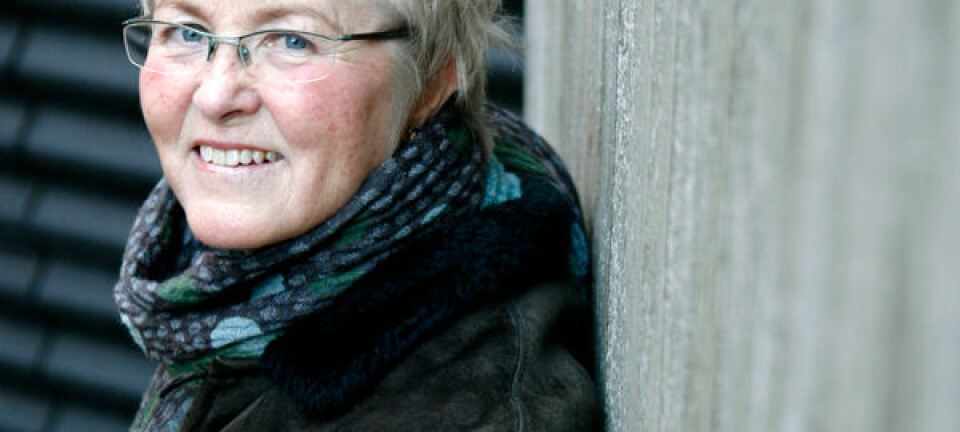
Women smell better than men
There are large differences between women’s and men’s sensory perception. But we still know too little about how differences between the sexes affect research results.
Denne artikkelen er over ti år gammel og kan inneholde utdatert informasjon.
Scientists use sensory panels when looking for objective descriptions of food based on sensory perception, such as taste, smell and appearance.
These panels are often comprised solely of women.
At the Norwegian Institute of Food, Fisheries and Aquaculture Research (Nofima), 12 women are permanently employed in tasting and smelling.
Women score higher in taste tests
“Women often score higher than men in tests of basic tastes such as salt, sweet, sour and bitter,” says Nofima Senior Researcher Margrethe Hersleth. “We also experience that women often outperform men at finding words to describe the tastes.”

Josefine Skaret is the manager of Nofima’s sensory laboratory and she explains that they employ people on the basis of their demonstrating keen senses. They haven’t intentionally selected women only.
“We haven’t excluded men, but we do want only the best,” says Skaret.
Man defeated at the finish line
Skaret tells that the last time the institute was hiring three new super sensors for its panel one man managed to pass pretty far in the elimination process.
Each applicant’s flair for tasting and smelling was tested and the man wasn’t eclipsed by the most discerning women until the final stage.

Skaret and Hersleth emphasise that when consumer tests chart the population as a whole they utilise an equal share of men and women.
Nofima only uses the panel in objective studies, for instance when they want to find out which foods taste the sweetest or saltiest.
“The only relevant skill in the panel is refined senses. We never ask our trained judges what they personally like best,” says Skaret.
Avoiding statistical noise
Researcher Hanne Lehn chose only women when she was selecting test persons for a research project that included memory tests involving smells, sounds and pictures.

“There are studies indicating that women are better than men at detecting smells −whether they can smell anything in the room and whether they can identify it,” says Lehn. She’s a postdoc at the Department of Circulation and Medical Imaging at the Norwegian University of Science and Technology (NTNU).
“Having grounds to believe gender differences exist here, we wish to limit ourselves to just one sex,” she adds.
Lehn explains this minimises the chances of residual information in answers among test persons.
“Differences create ‘noise’ in the results. When we’re testing anything rather novel it’s vital for us to know we can make our measurements without noise.”
Men navigate alone

The tables are turned when studies are being made of navigation skills. That’s where men rule.
Lehn says certain studies indicate men are generally better at finding new places and orienting themselves in space.
"If you don’t want a wide spread among your participants to impact results it could be beneficial to start out exclusively with men. Especially when investigating a difficult problem,” says Lehn.
Segregation of the sexes in this context reduces noise but research of this kind lacks universality.
When the results come in the researchers can’t generalise them to more than half the population at best. So follow-up studies are required using only men, for instance, or using both sexes.
Insufficient knowledge
Biologist Dag Olav Hessen asserts more knowledge about differences and similarities between the sexes is essential for research.
“There’s surely a good chance that we’re positing fictitious differences. In such cases there’s no actual need to separate the sexes. So it’s just as important to find out where you have parity and where you have real differences,” says Hessen.
He thinks women’s traditional role as care persons could give modern women certain sensory advantages.
“Women clearly have a better sense of smell, perhaps a better sense of taste as well – the two are connected.”
Hessen offers an evolutionary explanation: women as primary care persons have needed stronger senses, for instance to know whether food was good or bad.
Scientists agree that sexual disparities are worthy of studies.
“This is certainly important if you want to test groups, for instance with regard to smells. If you don’t make adjustments for sexual differences you can end up making mistakes,” says Hessen.
He thinks we need to fill in some gaps in this area and that we probably know too little about the gender differences.
Men are more often colour blind
Johan Fredrik Storm is a professor in brain research at the University of Oslo’s Institute of Basic Medical Sciences. He points to other sensory gender differences discovered by researchers.
“It’s well known that the most common form of colour blindness is more prevalent among men than women because it’s a sexually linked, genetic trait,” says Storm.
A woman has to inherit colour blindness from both parents to become colour blind, while men only need to get it from their mothers.
This is why eight per cent of all men are colour blind, as opposed to barely one per cent of women.
“To the best of my knowledge there are no evolution-rooted explanations for why men should be more frequently colour blind,” adds Storm.
The scent of a good partner
The brain researcher mentions a possible additional difference between the sexes regarding the sense of smell.
“Results have been reported which indicate women can smell similarity in genes, and thus choose partners who have different genes than their own − but these findings are controversial.”
Storm thinks we need to broaden our knowledge in this field.
"Obviously it depends on the contextual problem, but if a systematic difference in the sensory capabilities of men and women could be ascertained, we should probably take due account of this in future research,” he concludes.
-------------------------------------------
Read this article in Norwegian at forskning.no
Translated by: Glenn Ostling
































